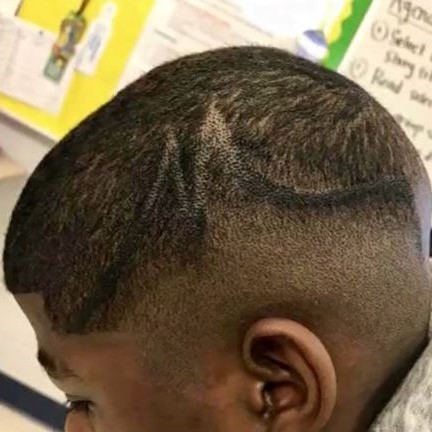Lawsuit: White School Employees Laugh As Black Boy’s Scalp Colored With Jet-Black Permanent Marker
A federal civil rights lawsuit was filed Sunday after a white Texas administrator watched two white employees color a Black student’s scalp with jet-black permanent marker.
Juelz “JT” Trice, 13, was a student at Berry Miller Junior High School when he told multiple news outlets that then-assistant Principal Tony Barcelona told him on April 17 that his haircut, which highlighted an “M” design, was a violation of the school dress code.
“He came over and said, ‘You have two options: You can either go to [in-school suspension] or color it in,'” Juelz told ABC affiliate KTRK.

The school is in the Pearland Independent School District, about 20 miles south of Houston in the city of Pearland. The city’s population is about 62 percent white and 16 percent Black, according to U.S. Census records.
The lawsuit filing Atlanta Black Star obtained maintains that Juelz was a track athlete who had never been in trouble when he was accused of breaking the dress code. He chose the marker because he didn’t want to jeopardize his participation on the school’s track team, according to the suit.
Randall Kallinen, the attorney who filed the suit on behalf of Juelz’s parents, named the school district, Barcelona, the discipline clerk Helen Day and teacher Jeanette Peterson in the lawsuit.
Kallinen said Barcelona sent the student to Day’s office and later joined them to witness Day handing Juelz a jet-black Sharpie marker.
When he started coloring his hair, the markings made the design more prominent and Kallinen said at that point Day took over coloring in the child’s scalp.
She only stopped after allegedly asking Peterson, who happened to stop by the office, to pick up where the discipline administrator left off.
All three employees laughed at the child, Kallinen alleged in the lawsuit.
“J.T. was not laughing but very frightened of these three much larger Pearland ISD employees coloring his scalp jet black,” Kallinen said in the lawsuit.
When the employees finished, Juelz was sent to study hall because he had missed Spanish class, Kallinen said.
He called the coloring job, which took many days to scrub off, “highly offensive.”
“There are hardly any African Americans in America with jet black skin and, of course, neither does J.T.” Kallinen said. “It is commonly understood among scholars and the general public that depicting African Americans with jet black skin is a negative racial stereotype.
“During the Jim Crow era slaves were often depicted as happy in their slave existence and with jet black skin as a means to disguise their humanity and imply that they are unlike ‘white’ people.”
In the incident involving Juelz, other students made fun of him and created memes about him, Kallinen said.
“J.T. was immensely humiliated and shamed,” he said.
The attorney also said in the lawsuit that Juelz’s parents weren’t notified of the decision to color their child’s hair and that Day and Barcelona did not inform the child of his right to appeal the decision.
“After several attempts by the parents and their lawyer to resolve the issues with no response, the plaintiffs initiated this instant litigation for training and compensation,” Kallinen said in the lawsuit.
Barcelona was promoted to principal, and the school has since changed its dress code policy, according to the lawsuit.
The current dress code does not address hair designs but states that hair “must be clean, neat and well groomed” and that “distracting colors are not allowed.”
The school district has not yet responded to Atlanta Black Star’s request for comment.


